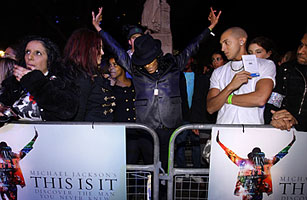
Fans gather in London's Leicester Square at the U.K. premiere of Michael Jackson's This Is It on Oct. 27, 2009
(2 of 2)
The movie is worlds removed from another making-of concert doc, Madonna's calculatedly scandalous Truth or Dare, and closer to old let's-put-on-a-show musicals like the Busby Berkeley 42nd Street, the Judy Garland–Mickey Rooney Babes in Arms and the Broadway standard A Chorus Line. It has all the elements: the big star (Jackson), the guiding impresario (Ortega) and, supporting them, a whole retinue of gifted, ambitious singers and dancers. The movie opens with the prospective dancers' declarations of the inspirational impact that Jackson has had on them. (O.K., they really need this job, but the effusions sound genuine.) Later, the men have to rehearse one of Jackson's more notorious dance figures. Apparently, grabbing your crotch while gliding across the stage is more difficult than it looks.
There are only two differences between This and the old musicals. Instead of the star breaking a leg, he dies after we see the fruit of his labors. And in This Is It the emphasis is not on love affairs — though Jackson proclaims a tender "I love you" to everyone in sight — but on the energizing, exhausting business of making a spectacle spectacular.
Ortega and Jackson had some Berkeley-size production numbers in mind. A version of "Smooth Criminal" interpolates Jackson into antique movie clips with Rita Hayworth, Humphrey Bogart and Edward G. Robinson. "They Don't Care About Us" sends 1,100 CGI soldiers marching down a kind of Champs-Elysées whose Arc de Triomphe is bent into an M for Michael. "Thriller" was to boast 3-D effects. And "Earth Song," the rain-forest-message number, has a dewy child (a girl, if you're wondering) facing down a bulldozer, which was then to motor toward the front of the stage, ready to devour the star. "Save Michael," he seemed to be saying, and save the planet.
But the coolest moments show Jackson unadorned and unplugged. He sings "Human Nature" nearly a cappella, blending vocal virtuosity and a choirboy's clarity; there's nothing false about his falsetto. His Terpsichore leads viewers through how-the-hell-does-he-do-that? astonishment into a mute appreciation of Jackson's ability to channel Fred Astaire's nonchalant elegance and fit it to the percussive drive of R&B. He gives dancing class and sex.
Jackson also plays well with others. There's a splendid duet with Judith Hill on "I Just Can't Stop Loving You" that's both a call-and-response act of communion and a little contest over who can show more soul. He urges his lead guitarist, the petite, blond Orianthi Panagaris, to release all the wildness her fingers can express. He's determined to get the best from everyone, and to think the best of them. Near the end, just before a powerful rendition of "Man in the Mirror," he thanks members of his family: "Jackie, Jermaine, Marlon, Tito, Randy ..." Then, remembering his mother, he adds, "I should also say Katherine. I love you." He's got a lot of love he needs to express.
No question that Jackson, deeply in debt to Sony and other creditors, needed the money that the concerts would generate. But his heroic effort and attention to detail suggest that this was no take-the-money-and-run greatest-hits scam. He saw This Is It as a career retrospective that would re-establish the value of his music and prove he still had the strength and the moves of 20, 30, 40 years ago. At times he tries to husband his resources: stinting on the vocalizing of one song, he apologizes, "I'm just trying to save my voice." Then the beat or the melody gets to him, and he helplessly transforms into the full-throttle kid.
For a modern entertainer who dies before his time, immortality is measured in residuals — the money from commemorative projects like this. Michael Jackson will have no resurrection — in the end, that was that — but the movie does earn him a redemptive legacy. It proves that, at the end, he was still a thriller. Fans and doubters alike can look at the gentle, driven singer-dancer at the center of this up-close document and say admiringly, This was him.